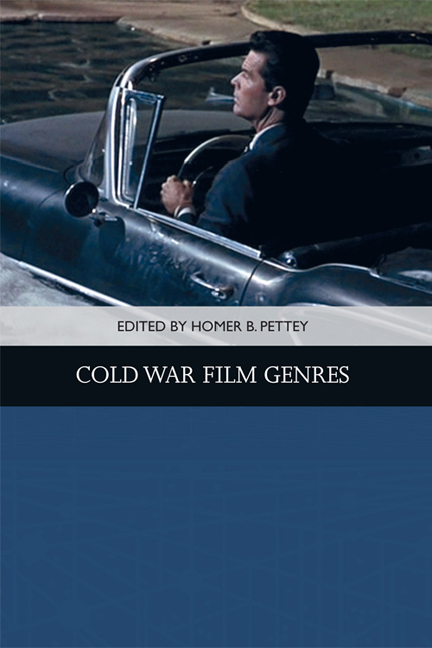Book contents
- Frontmatter
- Contents
- List of Illustrations
- Acknowledgments
- Notes on the Contributors
- 1 Introduction: Cold War Genres and the Rock-and-Roll Film
- 2 Social Factors in Brainwashing Films of the 1950s and 1960s
- 3 The Berlin Crisis? Piffl!: Billy Wilder’s Cold War Comedy, One, Two, Three
- 4 The Small Adult Film: A Prestige Form of Cold War Cinema
- 5 “I’m Lucky – I Had Rich Parents”: Disability and Class in the Postwar Biopic Genre
- 6 Rogue Nation, 1954: History, Class Consciousness, and the “Rogue Cop” Film
- 7 Internal Enmity: Hollywood’s Fragile Home Stories in the 1950s and 1960s
- 8 Suburban Sublime
- 9 Domestic Containment for Whom? Gendered and Racial Variations on Cold War Modernity in the Apartment Plot
- 10 Success and the Single Girl: Urban Romances of Working Women
- 11 Paris Loves Lovers and Americans Loved Paris: Gender, Class, and Modernity in the Postwar Hollywood Musical
- 12 Straight to Baby: Scoring Female Jazz Agency and New Masculinity in Henry Mancini’s Peter Gunn
- Index
7 - Internal Enmity: Hollywood’s Fragile Home Stories in the 1950s and 1960s
Published online by Cambridge University Press: 24 April 2021
- Frontmatter
- Contents
- List of Illustrations
- Acknowledgments
- Notes on the Contributors
- 1 Introduction: Cold War Genres and the Rock-and-Roll Film
- 2 Social Factors in Brainwashing Films of the 1950s and 1960s
- 3 The Berlin Crisis? Piffl!: Billy Wilder’s Cold War Comedy, One, Two, Three
- 4 The Small Adult Film: A Prestige Form of Cold War Cinema
- 5 “I’m Lucky – I Had Rich Parents”: Disability and Class in the Postwar Biopic Genre
- 6 Rogue Nation, 1954: History, Class Consciousness, and the “Rogue Cop” Film
- 7 Internal Enmity: Hollywood’s Fragile Home Stories in the 1950s and 1960s
- 8 Suburban Sublime
- 9 Domestic Containment for Whom? Gendered and Racial Variations on Cold War Modernity in the Apartment Plot
- 10 Success and the Single Girl: Urban Romances of Working Women
- 11 Paris Loves Lovers and Americans Loved Paris: Gender, Class, and Modernity in the Postwar Hollywood Musical
- 12 Straight to Baby: Scoring Female Jazz Agency and New Masculinity in Henry Mancini’s Peter Gunn
- Index
Summary
As Michael Wood notes in his discussion of the myths Hollywood came up with in the 1940s and 1950s so as to negotiate actual dilemmas, “America is not so much a home for anyone as a universal dream of home, a wish whose attraction depends upon its remaining at the level of a wish.” Applying this notion of home as a vaunted ideal to the anxieties engendered by the Cold War on the home front, it is further worth noting that any solution Hollywood films come up with to contain these fears can be only imaginary because, as Wood adds, if there were a real solution then there would be no need for mythic narratives. When, in turn, genre films at the time, and particularly the melodrama, make dramaturgic use of concrete homes to represent the idea of protection and comfort, these houses refer to a personal sense of belonging even as they also stand in for the nation as the geopolitical community whose safety one must be willing to protect at all costs. Under Senator Joe McCarthy's witchhunt against alleged Communist spies and sympathizers in the United States government and elsewhere, the Cold War not only turned into a domestic issue, rendering clear the fragility of any American dream of home. Rather, the logic of antagonism on which this international conflict was predicated also transformed into a struggle within. The simple opposition between “we” and ‘them’ transformed into the far more differentiated opposition of “we v. us,” in the context of which the home emerged as a contested site. In what Richard Hofstadter called “a paranoid style in American politics,” an anxious hypervigilance fostering the collective fantasy that subversive elements where living everywhere, undetected, ready to contaminate or attack their unsuspecting fellow men, underscored not only a crisis of national security but also of the home as its most effective cultural trope.
As point of departure for my discussion of the way Hollywood came to shape this imaginary threat to the nation as a subversion of the family by enemies within, I have chosen Joseph Weisberg's The Americans. The retrospective look at Cold War culture, which this television series offers, conceives of the house which the Soviet undercover agents, Philip and Elizabeth Jennings, inhabit in Falls Church explicitly as the stage for a struggle that renders both this home and the American homeland “uncanny.”
- Type
- Chapter
- Information
- Cold War Film Genres , pp. 123 - 143Publisher: Edinburgh University PressPrint publication year: 2018

